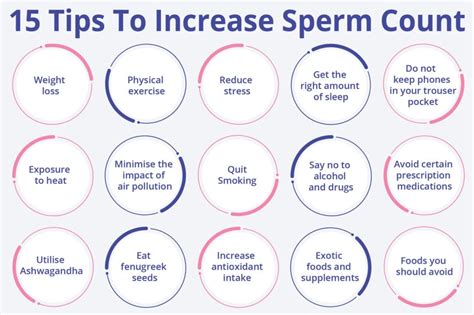How to Naturally Boost Your Sperm Count: A Comprehensive Guide
Many men worry about their sperm count, especially those trying to conceive. While a low sperm count (oligospermia) can have various underlying medical causes, many lifestyle factors significantly impact sperm production. This guide explores natural ways to improve sperm count and overall reproductive health. Remember, this information is for educational purposes and shouldn't replace professional medical advice. Always consult a doctor if you have concerns about your fertility.
Understanding Sperm Count and Fertility
Before diving into strategies for improvement, let's understand what constitutes a healthy sperm count and the factors influencing it. A healthy sperm count is generally considered to be above 15 million sperm per milliliter of semen. However, other factors like sperm motility (movement) and morphology (shape) also play crucial roles in fertility.
Factors Affecting Sperm Count:
- Lifestyle Choices: Smoking, excessive alcohol consumption, drug use, and a sedentary lifestyle all negatively impact sperm production.
- Diet: A diet lacking in essential nutrients can hinder sperm health.
- Stress: Chronic stress can disrupt hormonal balance, affecting sperm production.
- Weight: Both obesity and being underweight can negatively influence sperm count.
- Exposure to Toxins: Exposure to environmental toxins, pesticides, and heavy metals can damage sperm.
- Underlying Medical Conditions: Certain medical conditions, such as varicoceles (enlarged veins in the scrotum), infections, and hormonal imbalances, can affect sperm production.
Natural Ways to Boost Sperm Count
While medical interventions exist for low sperm count, many men find success through lifestyle changes. Here are some evidence-based strategies:
1. Optimize Your Diet:
What to include:
- Antioxidants: Foods rich in antioxidants, like blueberries, strawberries, and dark chocolate, combat oxidative stress which damages sperm.
- Zinc: Crucial for testosterone production and sperm development. Found in oysters, red meat, and pumpkin seeds.
- Selenium: Another important antioxidant for sperm health. Found in Brazil nuts, tuna, and eggs.
- Vitamin C: Protects sperm from damage. Abundant in citrus fruits, peppers, and strawberries.
- Vitamin D: Plays a vital role in testosterone production. Sunlight exposure and fatty fish are good sources.
- Folic Acid: Essential for DNA synthesis and sperm production. Found in leafy green vegetables and fortified cereals.
What to limit:
- Processed foods: These often contain harmful chemicals and lack essential nutrients.
- Sugary drinks: High sugar intake is linked to reduced sperm quality.
- Saturated and Trans Fats: These contribute to inflammation and can negatively impact sperm health.
2. Exercise Regularly:
Regular moderate-intensity exercise improves overall health, including reproductive health. Aim for at least 30 minutes of moderate exercise most days of the week. Avoid excessive strenuous exercise, as this can have the opposite effect.
3. Manage Stress:
Chronic stress significantly impacts hormone levels, affecting sperm production. Practice stress-reducing techniques like yoga, meditation, deep breathing exercises, or spending time in nature.
4. Limit Alcohol and Tobacco:
Excessive alcohol consumption and smoking are detrimental to sperm health. Moderate your alcohol intake and quit smoking to improve sperm count and overall health.
5. Maintain a Healthy Weight:
Being overweight or underweight can disrupt hormone balance and affect sperm production. Strive to maintain a healthy BMI through a balanced diet and regular exercise.
6. Minimize Exposure to Toxins:
Reduce exposure to environmental toxins, pesticides, and heavy metals as much as possible. This includes using natural cleaning products and avoiding exposure to industrial chemicals.
7. Ensure Adequate Sleep:
Sufficient sleep is crucial for hormone regulation and overall well-being. Aim for 7-9 hours of quality sleep per night.
When to Seek Medical Attention
If you're concerned about your sperm count or having difficulty conceiving, consult a doctor or fertility specialist. They can perform a semen analysis to assess your sperm parameters and identify any underlying medical conditions. They can also provide personalized advice and treatment options.
Disclaimer: This information is for educational purposes only and should not be considered medical advice. Always consult with a healthcare professional for any health concerns or before making any decisions related to your health or treatment.
